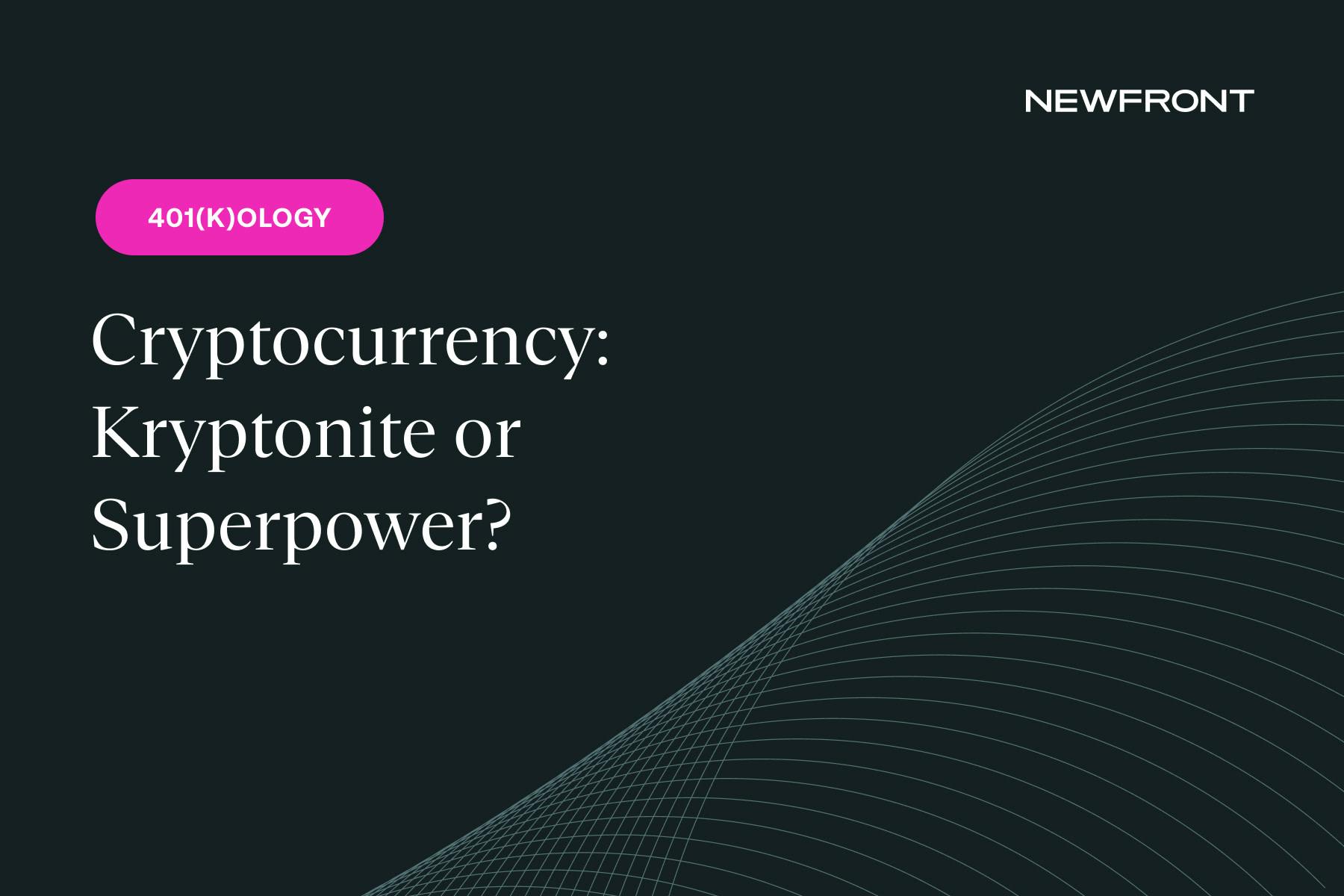401(k)ology- Cryptocurrency: Kryptonite or Superpower?
By Joni L. Jennings, CPC, CPFA®, NQPC™ | Published May 11, 2022

Investing in cryptocurrency is a trending topic that will likely spark much debate, especially in the 401(k) plan arena. Fidelity Investments announced on April 26, 2022 that it would be facilitating investments in Bitcoin for 401(k) plan sponsors through Digital Asset Accounts. That announcement came on the heels of the Department of Labor’s Compliance Assistance Release on March 10, 2022 with a stern warning to plan fiduciaries looking to add cryptocurrency as an investment option in qualified retirement plans.
With trillions of dollars in retirement plan assets at stake, it is no wonder that opinions are being launched from every direction with very different viewpoints. What exactly is cryptocurrency, how does it work and why all the fuss?
What is Cryptocurrency?
Cryptocurrency is simply a virtual digital currency. Digital currency has no central regulatory authority or government that controls it or its price. Digital currency is a method for people to exchange cash on the internet in a peer-to-peer transaction system. It is not backed by anything like gold and is not an investment in a specific company like Coca-Cola. Unlike stocks, bonds or mutual funds, digital currency does not pay any interest or dividends.
How do Virtual Currencies Make Money?
When you purchase a coin or token of digital currency, that coin or token will collect fees from blockchain transactions. Blockchains can focus on specific business segments or start-up entities, and there are different coins for different types of blockchains. Blockchains are the technology drivers for virtual currency, described as shared public ledgers (that cannot be altered) used to record and track assets. Once a transaction is logged in the blockchain, it resides there indefinitely.
Blockchains can be used to track both tangible and intangible assets. As such, it can be used to track a wide variety of business data (e.g., food supply chains or healthcare records). Only members of the specific blockchain have access to view the transactions, although some blockchains may be public. Because the chains cannot be altered, the data is more reliable; and, with no middleman involved, the data may be shared more expeditiously. That all sounds great, so what is the catch?
The Kryptonite of Cryptocurrency
Investing in digital currency is not entirely secure due to the storage of the currency through digital wallets dependent on passcodes or in digital code stored in the cloud. The digital currency exchanges may be vulnerable to cyberattacks, cyberthieves and computer bugs. Digital currency is also highly volatile and can be impacted by a single tweet, political situation, news post, or world event. Digital currency has liquidity risk, meaning you may not be able to sell it when you need cash. Unlike federally regulated securities, currently there are no prospectus or valuations for investors to review to make investment decisions on which digital currency to purchase.
In addition, the Department of Labor (“DOL”) may be the very kryptonite that slows investing of retirement plan assets in cryptocurrencies. On March 10, 2022, the DOL issued Compliance Assistance Release No. 2022-01 in which it gave plan fiduciaries a glaring warning against such investments, stating that “the Department has serious concerns about the prudence of a fiduciary’s decision to expose a 401(k) plan’s participants to direct investments in cryptocurrencies.” The DOL added that plan fiduciaries adding cryptocurrencies and related products should expect to be questioned by the DOL “about how they can square their actions with their duties of prudence and loyalty” considering the risks associated with the investments.
The Superpowers of Bitcoin
It goes without saying that the early investors in Bitcoin, who invested very little per coin ($0.05 per coin in 2010) are feeling elated these days with the value hovering in the $35,000 to $45,000 per coin range. For some, very little turned into multiple millions. Who wouldn’t want that superpower? But, as they say, hindsight is 20-20 vision. Investors with long-term investment strategies may have the stomach to handle the high volatility for the opportunity of very high returns.
Supporters of cryptocurrency speculate that cryptocurrency will be the mainstream bank of the future and predict that the high returns experienced by Bitcoin will continue. Even large institutional investors, including Fidelity Investments, are taking a bullish approach toward investing in cryptocurrency, as evidenced in Fidelity’s request to the DOL to retract its guidance discouraging plans from offering cryptocurrencies as an investment option.
It should also be noted that Fidelity is not alone in the request to the DOL to retract the release. Several prominent industry trade groups, including the American Benefits Council, the ERISA Industry Committee, and the U.S. Chamber of Commerce, submitted a joint letter to the DOL stating “Respectfully, we ask that the cryptocurrency guidance be withdrawn, pending a robust notice and comment period.”
What Should Plan Sponsors and Plan Fiduciaries Know?
Fiduciaries have a duty of prudence and a duty of loyalty to plan participants. Retirement plans must be maintained for the exclusive benefit of the participants to provide retirement benefits. Any investment included in a retirement plan must be monitored and evaluated by the fiduciaries, including reasonableness of fees and investment performance. The Employee Retirement Income Security Act (“ERISA”) requires the highest standards of prudence and care from plan fiduciaries. That standard is true whether the investment is a mutual fund or perhaps cryptocurrency. Another fiduciary requirement is the diversification of investments, and given the current landscape, may be an argument for including cryptocurrency in a portfolio; however, the risks must be weighed with the rewards.
Conclusion
Cryptocurrency may be an investment that some savvy participants want access to in their 401(k) plan, but the DOL has cautioned it may not be an appropriate addition to the investment menu from a fiduciary standpoint. If you are considering the addition of cryptocurrency investment products in your 401(k) plan, we recommend the plan’s investment committee have a thorough discussion with the plan’s investment advisors to discuss the fiduciary prudence of the option. While there may be significant interest from employees in offering a cryptocurrency focused investment, there are significant fiduciary considerations that the committee should understand, particularly due to the volatility in cryptocurrencies and DOL guidance.
At Newfront, we partner with employers to provide financial expertise and advice in their plan investment menu to best help employees achieve their retirement goals. Some employers we work with believe strongly that their responsibility to employees demands exploration of cryptocurrency and digital assets as a plan investment opportunity because of the tremendous potential upside. We support employers by carefully reviewing both the advantages and the significant challenges associated with this new asset class, particularly given the recent guidance from the DOL expressing concerns about the multiple forms of risks in this area. Our goal is to assist employers with coming to an informed decision. It appears inevitable that more and more employers will consider thoughtful methods of making cryptocurrencies available as an investment in a manner that they can confidently stand by as in the best interest of employees.
Our team of retirement plan professionals at Newfront is available to assist you with any questions regarding cryptocurrency in your 401(k) Plan.
Helpful Quick Links
DOL Compliance Assistance Release No. 2022-01
Fidelity Investments Press Release – Bitcoin Offerings in 401(k) Plans
Joint Letter to DOL on 401(k) Plan Investments in Cryptocurrencies

Joni L. Jennings, CPC, CPFA®, NQPC™
Chief Compliance Officer, Newfront Retirement Services, Inc.
Joni Jennings, CPC, CPFA®, NQPC™ is Newfront Retirement Services, Inc. Chief Compliance Officer. Her 30 years of ERISA compliance experience expands value to sponsors of qualified retirement plans by offering compliance support to our team of advisors and valued clients. She specializes in IRS/DOL plan corrections for 401(k) plans, plan documents and plan design.


